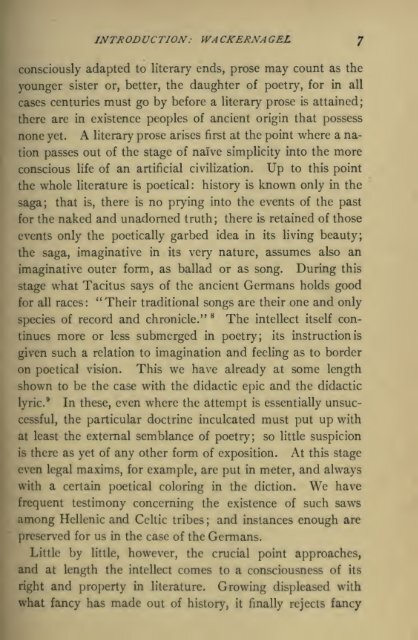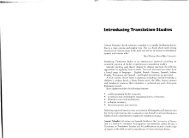- Page 1 and 2: i ! lilt
- Page 7: THEORIES OF STYLE IN LITERATURE
- Page 10 and 11: piV COPYRIGHT, 1907, BY THE MACMILL
- Page 12 and 13: viii PREFACE prise all literature.
- Page 14 and 15: X PREFACE cicnt free play of opinio
- Page 16 and 17: xii PREFACE and Aristotle respectiv
- Page 18 and 19: xiv BIBLIOGRAPHY 1 6. * BECKER, K.
- Page 20 and 21: xvi BIBLIOGRAPHY 51. ELLWANGER, W.
- Page 22 and 23: Xviii BIBLIOGRAPHY 88. LANSON, G. C
- Page 24 and 25: XX BIBLIOGRAPHY 124. RALEIGH, W. St
- Page 26 and 27: Xxii BIBLIOGRAPHY 157. WISEMAN, N.
- Page 29 and 30: . Switzerland, THEORIES OF STYLE IN
- Page 31 and 32: ; that INTRODUCTION: WACKERNAGEL 3
- Page 33: INTRODUCTION: WACKERNAGEL 5 that in
- Page 37 and 38: INTRODUCTION: WACKERNAGEL 9 making
- Page 39 and 40: : -ak, INTRODUCTION: WACKERNAGEL II
- Page 41 and 42: i ,,f INTRODUCTION: WACKERNAGEL 13
- Page 43 and 44: INTRODUCTION: WACKERNAGEL 15 betwee
- Page 45 and 46: INTRODUCTION: WACKERNAGEL I/ and di
- Page 47 and 48: The INTRODUCTION: WACKERNAGEL 19 th
- Page 49 and 50: ,-d. INTRODUCTION: WACKERNAGEL 21 e
- Page 51 and 52: PLATO 23 n PLATO (B.C. 428-347) Fro
- Page 53 and 54: PLATO 25 sweetest utterance. to tal
- Page 55 and 56: PLATO 27 Soc. Is not rhetoric, take
- Page 57 and 58: PLA TO 29 into the opposite of trut
- Page 59 and 60: * PLATO 31 of Achelous and Soc. The
- Page 61 and 62: PLATO 33 Phcrdr. True. Soc. The div
- Page 63 and 64: PLATO 35 Soc. Yes; thank you for re
- Page 65 and 66: i IM- PLATO 37 Soc. And suppose tha
- Page 67 and 68: . was PLA TO 39 Soc. I conceive Per
- Page 69 and 70: * him, PLATO 41 soul is persuaded b
- Page 71 and 72: PLATO 43 concerned who are just and
- Page 73 and 74: 1 take PLATO 45 Soc. Enough appears
- Page 75 and 76: PLATO 47 Phcedr. That is most true.
- Page 77 and 78: . Show PLATO 49 Soc. And now, Phacd
- Page 79 and 80: PLATO 51 or not ; and to Solon and
- Page 81 and 82: . and rive ARISTOTLE 53 scientific
- Page 83 and 84: ARISTOTLE 55 larly considered, and
- Page 85 and 86:
ARISTOTLE . 57 perform its proper f
- Page 87 and 88:
ARISTOTLE 59 rhetorical speech. Amo
- Page 89 and 90:
ARISTOTLE 6 1 pous for the subject,
- Page 91 and 92:
ARISTOTLE 63 result may be attained
- Page 93 and 94:
ARISTOTLE 65 want to express is des
- Page 95 and 96:
ARISTOTLE 67 comparison of the comm
- Page 97 and 98:
ARISTOTLE 69 should be properly ass
- Page 99 and 100:
ARISTOTLE J\ mode of treatment by n
- Page 101 and 102:
1 ARISTOTLE 73 carry the harshness
- Page 103 and 104:
M ARISTOTLE 75 definition of it. *
- Page 105 and 106:
ARISTOTLE JJ indefinite style and b
- Page 107 and 108:
ARISTOTLE 79 are connected together
- Page 109 and 110:
; i ARISTOTLE 8 1 the present treat
- Page 111 and 112:
,m ARISTOTLE 83 nians told them the
- Page 113 and 114:
i . ARISTOTLE 85 * Lycolcon in beha
- Page 115 and 116:
think, ARISTOTLE 8/ for in all thes
- Page 117 and 118:
ARISTOTLE 89 e.g. the remark that A
- Page 119 and 120:
ARISTOTLE 9 1 water dripping upon i
- Page 121 and 122:
. d orepideit ARISTOTLE 93 the nece
- Page 123 and 124:
ARISTOTLE 95 be mentioned several t
- Page 125 and 126:
LONGINUS 97 IV LONGIXUS On the Subl
- Page 127 and 128:
1 appearance LONGINUS 99 not is usu
- Page 129 and 130:
e LONGINUS IOI iy, where the natura
- Page 131 and 132:
LONGINUS IO3 their destruction was
- Page 133 and 134:
: LONGINUS 105 VII It is proper to
- Page 135 and 136:
at LONGINUS IO7 fecting, as we may
- Page 137 and 138:
: >tion LONGINUS 109 " A trumpet so
- Page 139 and 140:
: ]' n LONGINUS 1 1 1 which comes w
- Page 141 and 142:
LONGINUS 113 has observed to be act
- Page 143 and 144:
. between LONGJNUS 115 larly Demost
- Page 145 and 146:
: but he burns and sweeps away all
- Page 147 and 148:
LONGINUS 119 Homer, like a young ch
- Page 149 and 150:
LONGINUS 121 " With tail he lashes
- Page 151 and 152:
LONGINUS 123 " Off, off, I say I kn
- Page 153 and 154:
LONGINUS 125 above their misfortune
- Page 155 and 156:
. LONGINUS 127 their grandeur and b
- Page 157 and 158:
LONGINUS 129 XX But nothing is so c
- Page 159 and 160:
LONGINUS 131 Phocaea in Herodotus:
- Page 161 and 162:
' \'GfNUS 133 " There came forth He
- Page 163 and 164:
LONGINUS 135 xxvn Sometimes, again,
- Page 165 and 166:
LONGINUS 137 " burial is to be publ
- Page 167 and 168:
i one LONGINUS 139 Caecilius censur
- Page 169 and 170:
LONGINUS 14! the source of the rapi
- Page 171 and 172:
i . ritus LONGINUS 143 proper to an
- Page 173 and 174:
LONGINUS 145 passion; his mythical
- Page 175 and 176:
LONGINUS 147 masses of rock, and to
- Page 177 and 178:
LONGINUS 149 is recent so that it s
- Page 179 and 180:
. and LONGINUS 151 who stand by the
- Page 181 and 182:
LONGINUS 153 his arrangement than o
- Page 183 and 184:
LONGINUS 155 gold and silver plate
- Page 185 and 186:
Consider, LONGINUS 157 the tlame of
- Page 187 and 188:
LONGINUS 1 59 when the whole life o
- Page 189 and 190:
SWIFT l6l struct us in the business
- Page 191 and 192:
SWIFT 163 beatific vision, with a t
- Page 193 and 194:
SWIFT 165 And truly, as they say a
- Page 195 and 196:
SWIFT 167 one part of their congreg
- Page 197 and 198:
BUFFON 169 VI BUFFON (1707-1788) "D
- Page 199 and 200:
enter. BUFFON I/I and display their
- Page 201 and 202:
BUFFON 173 terruptions, pauses, sec
- Page 203 and 204:
BUFFON 175 Again, nothing is more o
- Page 205 and 206:
: but BUFFON 177 have trained and b
- Page 207 and 208:
BUFFON 179 1 For example, Voltaire,
- Page 209 and 210:
VOLTAIRE . l8l taught. They presupp
- Page 211 and 212:
VOLTAIRE 183 " I'm going to leave y
- Page 213 and 214:
VOLTAIRE 185 tints which even- writ
- Page 215 and 216:
VOLTAIRE IS/ It ought to read: will
- Page 217 and 218:
, VOLTAIRE 189 " Hercules was a phy
- Page 219 and 220:
VOLTAIRE IQI * This much of the art
- Page 221 and 222:
GOETHE 193 impartial study, thought
- Page 223 and 224:
: until, OOETHE 195 of the a b c's
- Page 225 and 226:
GOETHE 197 playing over the brillia
- Page 227 and 228:
COLERIDGE 199 IX SAMUEL TAYLOR COLE
- Page 229 and 230:
' COLERIDGE 2OI Ful looth were hym
- Page 231 and 232:
COLERIDGE 203 " Concerning Faith, t
- Page 233 and 234:
COLERIDGE 205 party; you may detect
- Page 235 and 236:
COLERIDGE 2O? verbal than Johnson's
- Page 237 and 238:
. ed ' D ' DE QUINCE Y 2OQ THOMAS D
- Page 239 and 240:
DE QUINCEY 211 Pagan Literature has
- Page 241 and 242:
DE QUINCEY 21$ Sophocles, it is not
- Page 243 and 244:
DE QUINCEY 21$ of space, that is in
- Page 245 and 246:
DE QUINCEY 21? Three great agencies
- Page 247 and 248:
DE QUINCEY 2ig what we arc now wish
- Page 249 and 250:
1 he DE QULVCEY 221 so grand, and b
- Page 251 and 252:
DE QUINCEY 223 and their own peculi
- Page 253 and 254:
Me DE QUINCEY 22$ effect a transiti
- Page 255 and 256:
, DE QUINCE Y 22J (" Let no one ent
- Page 257 and 258:
DE QUINCE Y 22$ and previous prepar
- Page 259 and 260:
DE QUINCE Y 231 dcncd by one word i
- Page 261 and 262:
DE QULVCEY 233 how composed, and ho
- Page 263 and 264:
DE QUINCEY 235 stage or hustings pu
- Page 265 and 266:
DE QUINCEY 237 Well might the poor
- Page 267 and 268:
DE QUINCE Y 239 sccnical poetry or
- Page 269 and 270:
ed DE QUINCE Y 241 of Radicalism, t
- Page 271 and 272:
) with DE QUINCE Y 243 wit, that th
- Page 273 and 274:
THOREAU 245 XI HENRY DAVID THOREAU
- Page 275 and 276:
: THOREAU 247 A perfectly healthy s
- Page 277 and 278:
TIIOREAU 249 record his day's exper
- Page 279 and 280:
1 < & SCIIOPENHA UER 2 5 I xn ARTHU
- Page 281 and 282:
long SCHOPENHA UER 2 5 3 they to do
- Page 283 and 284:
; truth; but SCHOPENHA UER 255 perf
- Page 285 and 286:
- ^ ' SCHOPEXIIA I 'ER c \press him
- Page 287 and 288:
SCHOPENHA UER 259 The same distinct
- Page 289 and 290:
SCHOPENHA L /.A 1 26 1 An obscure a
- Page 291 and 292:
' SCHOFEXHA UER 263 instance, what
- Page 293 and 294:
SCHOPENHAUER 265 holding a monologu
- Page 295 and 296:
SCHOPENHAUER 267 order, an
- Page 297 and 298:
SCHOPENHAUER 269 rupt oneself. But
- Page 299 and 300:
SPENCER 271 The doctrine of economy
- Page 301 and 302:
SPENCER 273 as they would be were t
- Page 303 and 304:
rm SPENCER 275 right choice and col
- Page 305 and 306:
' SPENCER 277 of ideas aids the eff
- Page 307 and 308:
SPENCER 279 backwards and forwards
- Page 309 and 310:
SPENCER 28l even though the mind sh
- Page 311 and 312:
SPENCER 283 And as these qualificat
- Page 313 and 314:
SPENCER 285 The general principle o
- Page 315 and 316:
SPENCER 287 style, as contrasted wi
- Page 317 and 318:
instructions SPENCER 289 \Ye came t
- Page 319 and 320:
SPENCER 291 special attitude intend
- Page 321 and 322:
SPENCER 293 Mutter'd to wretch by n
- Page 323 and 324:
SPENCER 295 to be understood from a
- Page 325 and 326:
SPENCER 297 image, the adjectives b
- Page 327 and 328:
SPENCER 299 " Richter says, in the
- Page 329 and 330:
SPENCER 301 hyperboles, and personi
- Page 331 and 332:
SPENCER 303 placed accent or a supe
- Page 333 and 334:
SPENCER 305 regain their full power
- Page 335 and 336:
SPENCER 307 a dents, que mes moycns
- Page 337 and 338:
SPENCER 309 to a desired conclusion
- Page 339 and 340:
SPENCER 311 same faculties, it will
- Page 341 and 342:
LEWES 313 The first editor of the F
- Page 343 and 344:
LEWES 315 by Style that writers gai
- Page 345 and 346:
LEWES 317 been the result of their
- Page 347 and 348:
'. n LEWES 319 to express himself i
- Page 349 and 350:
LEWES 321 No Style can be good that
- Page 351 and 352:
LEWES 323 (which unhappily was not
- Page 353 and 354:
LEWES 325 but in virtue of their co
- Page 355 and 356:
LEWES 327 sending forth his thought
- Page 357 and 358:
ecause LEWES 329 represented so as
- Page 359 and 360:
>mbincd LEWES 331 happy talent will
- Page 361 and 362:
LEWES 333 the machine, and to use i
- Page 363 and 364:
LEWES 335 by its retarding influenc
- Page 365 and 366:
LEWES 337 in one indivisible moment
- Page 367 and 368:
LEWES 339 the artist tells him when
- Page 369 and 370:
1 should LEWES 341 dramatist must h
- Page 371 and 372:
LEWES 343 my thought. Whereas, if i
- Page 373 and 374:
. But < rved LEWES 345 of that also
- Page 375 and 376:
LEWES 347 cause weak, there is no a
- Page 377 and 378:
LEWES 349 sistence, that the propos
- Page 379 and 380:
and without an echo of other voices
- Page 381 and 382:
LEWES 353 him in darkness, and when
- Page 383 and 384:
LEWES 355 richest jewels of Golcond
- Page 385 and 386:
: but, LEWES 357 disorder of nature
- Page 387 and 388:
LEWES 359 instead of several I have
- Page 389 and 390:
; can LEWES 361 even- phrase was a
- Page 391 and 392:
LEWES 363 'From DeQuinccy's essay o
- Page 393 and 394:
STEVENSON 365 It is path-breaking a
- Page 395 and 396:
STEVENSON 367 and ity, vigor: no hi
- Page 397 and 398:
STEVENSON 369 and then deftly evade
- Page 399 and 400:
STEVENSON 371 texture? I am tempted
- Page 401 and 402:
STEVENSON 373 and still persist in
- Page 403 and 404:
STEVENSON 375 the two patterns woul
- Page 405 and 406:
STEVENSON 377 fresh variety of move
- Page 407 and 408:
STEVENSON 379 upon assonance. The v
- Page 409 and 410:
STEVENSON 381 the current s is most
- Page 411 and 412:
STEVENSON 383 visable to taKe. But
- Page 413 and 414:
STEVENSON 385 1 In th Contemporary
- Page 415 and 416:
or, PATER 387 Pater's strenuous ins
- Page 417 and 418:
PA TER 389 somewhat diminished effe
- Page 419 and 420:
PATER 391 else than a transcriber;
- Page 421 and 422:
juin\. L*\**-V~~ . His is PATER 393
- Page 423 and 424:
not PATER 395 dictionary, and still
- Page 425 and 426:
'hat PATER 397 Different classes of
- Page 427 and 428:
PA TER 399 The elementary particles
- Page 429 and 430:
PATER 4OI surprises^ and afterthoug
- Page 431 and 432:
PATER 403 fire," people say, "has t
- Page 433 and 434:
PATER 405 " I am reading over again
- Page 435 and 436:
independent PA TER 407 to the reade
- Page 437 and 438:
PATER 409 Flaubert there was, below
- Page 439 and 440:
PATER 411 to the subjectivity, the
- Page 441 and 442:
PATER 413 'The distinction passes g
- Page 443 and 444:
BR UNE TIERE 4 1 5 ing for success
- Page 445 and 446:
BR UNE TIERE 4 1 7 them to account,
- Page 447 and 448:
the BRUNETIERE 4*9 deliberately, a
- Page 449 and 450:
BRUNET1ERE 4 21 Walloons or to litt
- Page 451 and 452:
I mind- BRUNETIERE 423 as George Sa
- Page 453 and 454:
BRL\\ 7 ETIERE 425 ***** De nobles
- Page 455 and 456:
BRUNETIERE 427 a body of hearers; a
- Page 457 and 458:
'un- BRUNETI&RE 429 calls for too c
- Page 459 and 460:
BR UNETIERE 4 3 1 which should be a
- Page 461 and 462:
BRUXETIERE 433 nothing is more dang
- Page 463 and 464:
: that HARRISON 435 XVIII FREDERIC
- Page 465 and 466:
. says HARRISON 437 cricket can be
- Page 467 and 468:
HARRISON 439 " articles and smart r
- Page 469 and 470:
, an - 1/AKXISON 441 Mater is conce
- Page 471 and 472:
HARRISON 443 of this kind language,
- Page 473 and 474:
HARRISON 445 wrote correct Latin co
- Page 475 and 476:
1 HARRISON 447 dimmed our respect f
- Page 477 and 478:
. it HARRISON 449 It is a good rule
- Page 479 and 480:
in 1 of . HARRISON 45 1 Read Voltai
- Page 481 and 482:
. 108, ' ' INDEX OF PROPER NAMES Ac
- Page 483 and 484:
, George, IXDKX 455 Dante, xxi, 4,
- Page 485 and 486:
. 283, . C. , E., ' . INDEX 457 Jou
- Page 487 and 488:
. 112, . Rhys, ' INDEX 459 Racine,
- Page 489 and 490:
Studies in Structure and Style Base
- Page 491 and 492:
->urces i .c An Introduction to the
- Page 495:
PLEASE DO NOT REMOVE CARDS OR SLIPS







